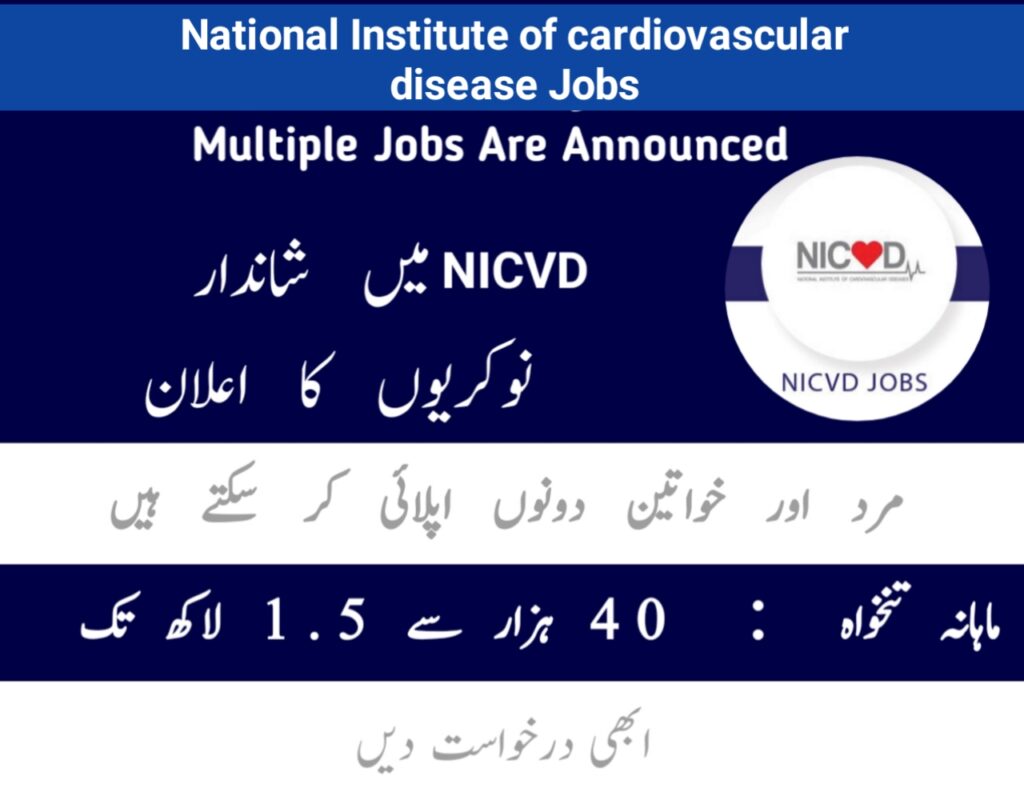Introduction:
In Pakistan, cardiovascular diseases (CVDs) continue to pose a significant health burden, contributing to a substantial number of deaths and disabilities each year. In response to this growing challenge, the National Institute of Cardiovascular Diseases (NICVD) stands as a beacon of hope and progress, dedicated to the prevention, diagnosis, and treatment of cardiovascular ailments. Established to address the rising prevalence of heart disease in the country, the NICVD plays a pivotal role in advancing cardiovascular healthcare and improving outcomes for patients across Pakistan in 2024.
Historical Background:
The roots of the National Institute of Cardiovascular Diseases can be traced back to its inception in 1963 as the National Cardiovascular Centre (NCC) in Karachi. Over the decades, the institution has evolved and expanded its scope to become the premier cardiovascular healthcare facility in Pakistan. Initially focusing on clinical services, the NICVD has since diversified its activities to encompass research, education, and community outreach, reflecting its commitment to comprehensive cardiovascular care.
Mission and Objectives:
At the core of its mission, the NICVD aims to provide state-of-the-art cardiovascular services to all segments of society, regardless of socioeconomic status.
Prevention:
Educating the public about risk factors for cardiovascular diseases and promoting healthy lifestyle choices to prevent the onset of heart ailments.
Diagnosis:
Offering advanced diagnostic facilities and procedures to accurately assess cardiovascular health and identify underlying conditions.
Treatment:
Delivering comprehensive and personalized treatment plans, including medical therapy, interventional procedures, and cardiac surgeries, to address a wide range of cardiovascular disorders. 
Research:
Conducting innovative research to enhance understanding of cardiovascular diseases, develop new therapies, and improve clinical outcomes.
Education:
Training healthcare professionals in the latest techniques and best practices in cardiovascular medicine and surgery to build capacity and improve quality of care nationwide.
Infrastructure and Facilities:
The NICVD boasts a modern infrastructure equipped with cutting-edge technology and specialized facilities to deliver comprehensive cardiovascular care. Its main campus in Karachi features state-of-the-art catheterization laboratories, cardiac operating theaters, intensive care units, and outpatient clinics. Additionally, the institute has established satellite centers and outreach clinics in various cities across Pakistan to extend its services to underserved communities and remote areas.
Clinical Services:
The NICVD offers a wide range of clinical services encompassing preventive cardiology, diagnostic imaging, interventional cardiology, electrophysiology, cardiac surgery, and cardiac rehabilitation. Patients have access to a multidisciplinary team of cardiologists, cardiac surgeons, nurses, and support staff who collaborate to deliver personalized and evidence-based care. From routine check-ups to complex interventions, the institute caters to the diverse needs of patients with cardiovascular conditions, including coronary artery disease, heart failure, arrhythmias, and congenital heart defects.
Research and Innovation:
Research is a cornerstone of the NICVD’s mission to advance cardiovascular science and improve patient outcomes. The institute actively engages in basic, translational, and clinical research across various domains, including cardiovascular genetics, biomarkers, imaging modalities, and treatment strategies. By fostering collaboration with national and international partners, the NICVD contributes to the global body of knowledge on cardiovascular diseases and drives innovation in diagnosis, treatment, and prevention.
Education and Training:
In line with its commitment to capacity building, the NICVD offers comprehensive education and training programs for healthcare professionals at all levels. This includes residency training in cardiology and cardiac surgery, fellowship programs in subspecialty areas such as interventional cardiology and electrophysiology, as well as continuous medical education (CME) activities for practicing physicians and allied healthcare providers. Through structured curricula, hands-on experience, and mentorship, the institute equips trainees with the knowledge and skills necessary to deliver high-quality cardiovascular care.
Community Outreach:
Recognizing the importance of community engagement in promoting cardiovascular health, the NICVD conducts extensive outreach initiatives to raise awareness, provide screening services, and deliver preventive interventions. Mobile medical units are deployed to underserved areas to offer free cardiac screenings, blood pressure checks, and counseling sessions on healthy lifestyle habits. Public awareness campaigns, seminars, and health education workshops are also organized to empower individuals to take control of their heart health and seek timely medical attention when needed.
Collaborations and Partnerships:
The NICVD collaborates with a wide range of national and international partners, including government agencies, academic institutions, non-profit organizations, and industry stakeholders. These collaborations facilitate knowledge exchange, technology transfer, and resource sharing, enhancing the institute’s capacity to deliver cutting-edge cardiovascular care and conduct impactful research. By leveraging collective expertise and resources, the NICVD strives to address the complex challenges posed by cardiovascular diseases more effectively and efficiently.
Conclusion:
In conclusion, the National Institute of Cardiovascular Diseases plays a pivotal role in advancing cardiovascular healthcare in Pakistan. With its comprehensive approach encompassing clinical services, research, education, and community outreach, the NICVD continues to make significant strides in preventing, diagnosing, and treating cardiovascular diseases across the country. By fostering innovation, collaboration, and public engagement, the institute remains committed to its mission of saving lives and improving the cardiovascular health of the Pakistani population in 2024 and beyond.
